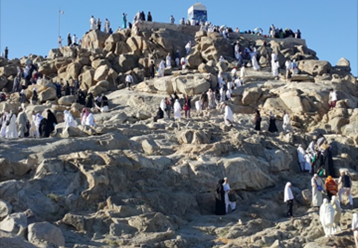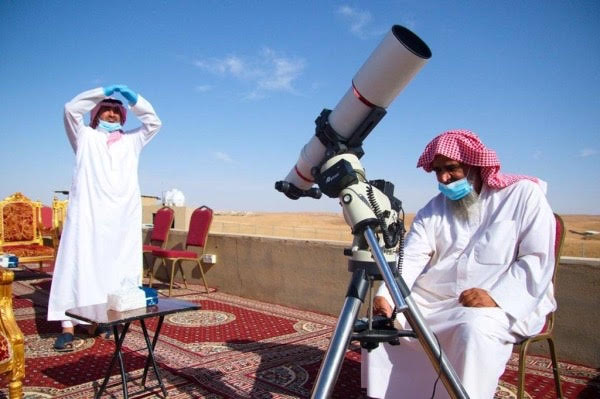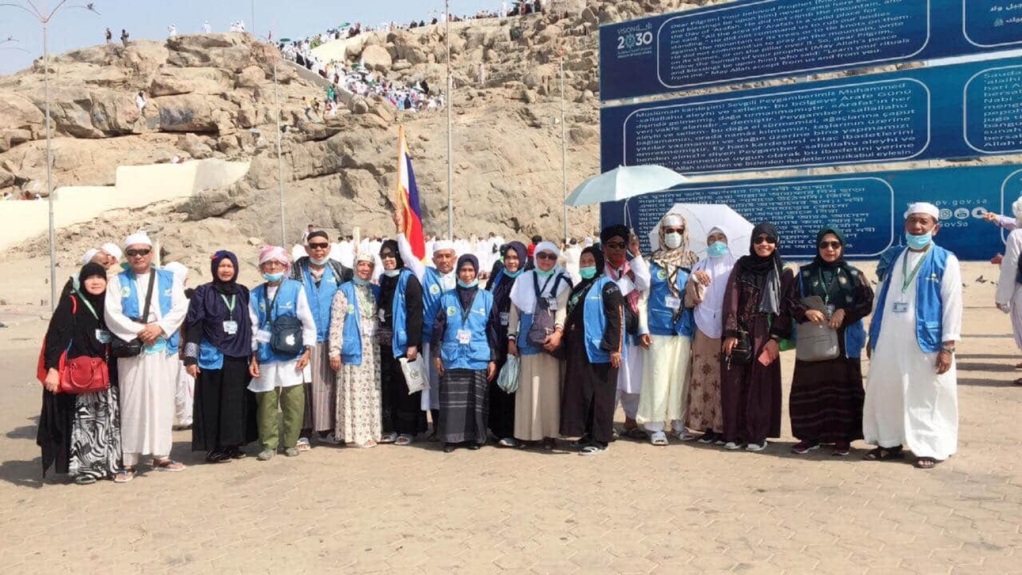Special Report: PILGRIMS ON THE DAY OF ARAFAT
By JULMUNIR I. JANNARAL
Managing Editor

About 1.6 billion Muslims around the world will mark on Friday, July 31, the Eid’l Adha or the Feast of Sacrifice which is one of the two major Muslim annual festivals, after the new moon was not sighted on Tuesday, July 21, the 29th day of Dhul Qa’dah, the month preceding Dhul Hijjah, the 10th day of which falls the Eid’l Adha.
As the Hijrah Calendar is based on the movement of the moon, moon-sighting in the Hijrah calendar is always done every 29th of each month and once it is sighted the first day of the next Hijrah month starts the following day. But if it not sighted, the present month shall have to be completed 30 days and henceforth begins the next month.
According to the Saudi Gazette report from Riyadh, the Saudi Arabia’s Supreme Court said the Day of Arafat was on July 30 (Thursday) and July 31 (Friday) will be the first day of Eid’l Adha.

Aleem Said Ahmad Basher, chairman of the Imam Council of the Philippines told the Philippine Muslim Today that July 21 (Tuesday) is the 30th of Dhul Qa’dah, and July 22 (Wednesday) marked the first day of Dhul Hijjah. Thus, Eid’l Adha was declared to be on July 31 (Friday), as announced also by the Saudi Press Agency (SPA).
Aleem Basher said the announcement followed the confirmation by a local moon-sighting committee formed to determine the beginning of the last month of the Islamic calendar.
COVID-19 affects Hajj 2020
However, Hajj 2020 is very much affected by the menace of Covid-19 pandemic where for the first time in history there is no Hajj delegation from the Philippines as well as from other countries.
Basher said most Imams consider the absence of no single Filipino pilgrim from the Philippines due to the pandemic as a test of faith not only for Muslims but also among non-Muslims throughout the world who are also sacrificing due to the menace of Covid-19 pandemic.
9th of Dhu al-Hijjah
Basher said on the 9th of the month of Dhu al-Hijjah pilgrims go to Arafat from Mina, for the most important part of the Hajj. The Khutbah of Hajj is narrated and Zuhr and Asr Prayers are prayed together. The pilgrims spend the whole day on the mountain to supplicate to Allah to forgive their sins and to pray for personal strength in the future.

He said Mount Arafat which is transliterated as Jabal ʿArafāt is a granite hill about 20 km (12 m) east of central Makkah in the plain of Arafat in the Hejaz, Saudi Arabia.
Mount of Mercy
Mount Arafat reaches about 70 m (230 ft) in height, and is also known as the “Mount of Mercy” (Jabal Ar-Raḥmah).
Basher said according to some Islamic tradition, the hill is the place where Prophet Muhammad stood and delivered the Farewell Sermon to the Muslims who had accompanied him for the Hajj towards the end of his life.
Muslims also say that it is also the place where Adam and Eve (Hawa) reunited on Earth after falling from Heaven, and where Adam was forgiven, hence it is known as the “Mount of Mercy.” A pillar is erected to show the place where the reunification of Adam and Eve took place.
Arafat Rituals
Arafat rituals end at sunset and pilgrims then move to Muzdalifah for Maghrib prayer and a shortened Isha prayer and for a short rest.
Aleem Basher said the level area surrounding the hill is called the Plain of Arafat. The term Mount Arafat is sometimes applied to this entire area. He said it is an important place in Islam because during the Hajj, pilgrims spend the afternoon there on the ninth day of Dhu al-Hijjah.
The Chairman of the Imam Council of the Philippines also warned that failure to be present in the plain of Arafat on the required day invalidates the pilgrimage.
BPE-NCMF confirms no Filipino pilgrims
Meanwhile, Director Malo Manonggiring of the Bureau of Pilgrimage and Endowment (BPE) of the National Commission on Muslim Filipinos (NCMF) last month confirmed to the Philippine Muslim Today of the no participation from the Philippines including pilgrims from other countries in this year’s hajj mainly due to the Covid-19 pandemic.
Director Manonggiring made the confirmation after he and NCMF Secretary Saidamen Pangarungan met Saudi Ambassador Abdullah N.A. Al Bussairy at the Embassy of the Kingdom of Saudi Arabia in Manila to discuss the latest developments about Hajj 2020.
Ambassador Al Bussairy informed Pilgrimage Director Manonggiring and NCMF Secretary Pangarungan that according to the Ministry of Hajj and Umrah, the Saudi government has limited the Haj 2020 to their citizens and expatriates living inside the Kingdom. However in accordance with the World Health protocols of social distancing still the number of pilgrims are also very limited.
The decision of the Ministry of Hajj and Umrah in effect bars all pilgrims coming from other countries to the Kingdom during this Hajj 2020.
The Saudi ambassador explained that the decision was reached “to ensure that the hajj ritual is conducted in a healthy and safe manner and that it meets the requirements for the prevention and social distancing necessary for the safety of the pilgrims, and to protect them from the dangers of the Coronavirus [COVID-19].”
Secretary Pangarungan welcomed the Saudi decision as he expressed the primordial objectives of the two respective governments of the Philippines and the Kingdom in fighting the virus globally and supporting the efforts of health organizations in controlling the spread of the deadly virus.
The NCMF Secretary also announced that all paid pilgrims may either leave their Mutawiff payments in the NCMF as their priority reservation for next year’s pilgrimage or apply for a refund of the amounts they paid. Those who will opt for a refund shall file their application with the NCMF regional office where they registered in accordance with the procedure for the refund of the Mutawiff payments.
Filipino Muslim leaders say Eid Mubarak
Nevertheless, several Muslim leaders have expressed their warmest Eid on Eid’l Adha to all Muslim Filipinos though nobody from the Philippines has left for Makkah to physically participate in the Hajj ritual of Tawaf or circumambulating seven times around Kaaba.
Bangsamoro Transition Authority (BTA) Member of Parliament Hadji Eddie Mapag Alih of Tawi-Tawi in his warmest greetings said, “On this blessed day of Eid’l Adha, we are celebrating and commemorating the sacrifice of Ibrahim (عليه السلام), a moment when he was put to a litmus test that we couldn’t possibly fathom. Embedded in this story of sacrifice is a profound meaning that I believe we could all benefit from especially in these trying times.
“In one way or another, we are all struggling and engaged in some form of sacrifice just to survive and provide for our loved ones amidst a pandemic the world has never seen. But we are holding on to dear life because coded in the DNA of a Muslim is the concept of optimism and hope.”
MP Alih said further, “We know in our heart of hearts, that divine wisdom is at play. That if we put our trust and hope in Allah (سبحانه وتعالىٰ), eventually we will triumph. Just as how Ibrahim (عليه السلام) and his son, Ismail (عليه السلام), were victorious in overcoming their ultimate test. In our darkest hours, we remind ourselves of the saying of Muhammad (صلى الله عليه وسلم) that, ‘amazing is the affair of the believer, verily his entire affair is good. If good befalls him he is grateful and that is good for him. If harm befalls him he is patient and that is good for him’.”
The MP from Tawi-Tawi has also called on the Bangsamoro people to be united and stay closer to one another as well as his recognition of the sacrifices of the front-liners during this pandemic.
“May Allah (سبحانه وتعالىٰ) grant us patience and may the eeman in our hearts illuminate and resonate in the world. May this Eid be a means to bring hope to the Bangsamoro people and unite us shoulder to shoulder with our feet firmly planted on the ground against all odds and adversities for the sake of Allah (سبحانه وتعالىٰ). And may Allah bless our frontliners and grant them steadfastness in their struggles and sacrifice. And may Allah grant the casualties of this Ummah during this pandemic martyrdom and jannatul firdaus. Allahumma ameen.”
Another Muslim leader wrote to the Philippine Muslim Today to extend too his Eid’l Adha warmest greetings to the Bangsamoro people especially the Muslim Ummah in the Philippines.
Datu Yusoph Boyog Mama, reigning Masirikampo sa Marawi (Traditional Royal Ruler of Marawi) also has a message for the Muslim Ummah.
Datu Yusoph Boyog Mama said, “In the midst of the global pandemic, greatly affecting all human communities, I wish to respectfully share with our brothers and sisters in the Islamic Ummah that just like the exemplary sacrifice of the patriarch, Nabi Ibrahim, our steadfastness and humility in demonstrating the best qualities of a good Muslim is eventually rewarded by the Almighty. The story of Ibrahim and his beloved son Ishmael is in fact a testament that piety, kind-heartedness, and unwavering devotion to Allah (SWT) overcome and weather trials on earth and in our lives. Eid’l Adha, and the Islamic practice of the Qurbani, therefore, commemorates the Almighty’s divine mercy for mankind and a reminder that as Muslims we should always work together as one community and extend succor and a ready helping hand to our own family, our relatives and friends, and the needy sectors of society that require our assistances the most.”
Datu Mama, who is also regarded as a Muslim technocrat having been elected at a time as National President of the NCCESO (National Council of Career Executive Service Organizations) adds, “It is generally regarded that Eid’l Adha is the holier of the two most important Islamic holidays, because whilst Eid’l Fitr commemorates the inward Jihad of spiritual purification through fasting and prayers, Eid’l Adha retells the ultimate sacrifice that a Mohmeen can make– which is the sacrifice of our most cherished possessions (in the case of Ibrahim is his first-born son, Ishmael) to satisfy and pass the divine test set by the Almighty. But all things considered, it is the “devotion” and niyyah (intention) that matter most and made acceptable to Allah (SWT) according to our Islamic understanding; and we hope that in these days of serious health and economic crisis period for the majority globally, we can all come together and be devoted to looking after our kinsmen and constituencies in the Bangsamoro, the Philippine Muslim society who need our caring leadership the most. The challenges of the Covid-19 pandemic is an opportunity to bring out the best in us as Muslims, and I believe we should stand by and support the proven sincerity and very able leadership of the present BARMM government in this regard. A meaningful Eid Mubarak to all!”
Hajj the 5th Pillar of Islam
Aleem Basher, said Eid’l Adha is the highlight of the performance of the fifth pillar of Islam, which is Hajj or Pilgrimage to Makkah (Mecca) in the Kingdom of Saudi Arabia.
Eid’l Adha is the second major festival of Islam aside from Eid’l Fitr that marks the end of Ramadan, the 4th pillar of Islam, when Muslims are bound by their faith to observe fasting for 29 or 30 days.
He also cited that Eid’l Adha is a commemoration of Prophet Ibrahim or Abraham’s unwavering faith in God and Ishmael’s acceptance of his fate.
Eid’l Adha, the Feast of Sacrifice
Hence, the feast of sacrifice or Festival of Sacrifice or Greater Eid is an important religious holiday observed by Muslims worldwide to commemorate the willingness of Abraham (Ibrahim) to sacrifice his son Ishmael (Isma’il) as an act of obedience to God.
“This is in the same situation when God tested the faith of Ibrahim to sacrifice his son Ishmael,” he added.
Meanwhile, Aleem Basher also made further explanation on Eid’l Adha saying that it is one of two major Eid festivals observed by Muslims wherein the basis of which comes from Sura 2 (Al- Baqara) Ayah 196 in the Qur’an.
The word “Eid” appears in Sura al-Mai’da (The Table Spread, Chapter 5) of the Qur’an, meaning solemn festival, he added.
Thus he also emphasized that Eid’l Adha is observed annually on the 10th day of the last Islamic month of Dhu al-Hijjah of the lunar Islamic calendar.
Like Eid’l Fitr, Eid’l Adha begins with a prayer of two rak’at (units) followed by a sermon (khutbah) which is equivalent to two rak’at too. (JULMUNIR I. JANNARAL)
